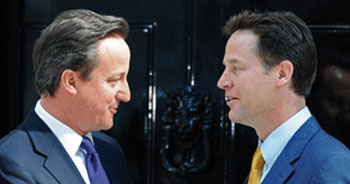Marriage

We had of course Kate & William which looks like the first successful royal marriage for a long time because of or despite that fact that the bride is an outsider. But most spectacularly we saw the Archbishop of Canterbury being routed by a combination of gay marriage and women bishops, unless this was just an excuse to run back to his Cambridge bolt-hole which would be perfectly understandable. And in this morning’s newspapers again we have David Cameron dithering about gay marriage; not his own of course though he and Nick Clegg are promising a renewal of their Rose Garden vows.
Perhaps us anthropologists have always had a more mechanical view of what marriage is for, which at the same time may shed some light on current debates about European marriage or indeed may need to be adjusted to reflect those debates.
Anthropologists see marriage primarily as a mechanism for ensuring social reproduction & regulating the other kind. Marriage with all its legal and/or religious trimmings is a socially sanctioned way for ensuring that the physical and non-physical valuables of one generation pass seamlessly (in principle) to the next. If looked at in this way it becomes obvious why families with more physical and non-physical valuables make more of a fuss about having a very noticeable marriage (dynastic marriage); and conversely why people who want to suggest that they have more than they actually do tend to hold exaggerated ceremonies (the Downton Abbey effect).
There are some diverting side issues; if marriage is largely about property and social continuity romantic love (‘lerve’)or fidelity are not priorities. Aren’t the aristocracy in any country famously cavalier about monogamy though not about marriage (See for example Charles/Diana/Camilla). And if physical reproduction does not match up then there are traditional ways of dealing with that; a new biography suggests that the late Queen Mother was the biological daughter of the palace cook, for example. Probably only in Jane Austen do all the elements fall into place; romantic love, large properties, successful reproduction, and the blessing of the vicar. But those couples who elope for love alone inevitably come to a sticky end.
On the other side of the coin it’s also interesting to see who does not or cannot get married: in traditional British working class communities (though this is disputed) having marriage formalized by religious or civic authorities was not always a priority.Anyway, in small non-mobile communities so the argument would go, the union was already closely witnessed & monitored. It’s interesting that Ed Miliband, the Labour Leader, only got married relatively recently… six months after his second child was born…. was he aligning himself with his Labour roots in some way or just demonstrating his exceptionally modern and secular outlook?
A group of people who were not allowed to marry – and therefore form social bonds and develop continuity – were the plantation slave population of the Caribbean, which arguably has affected marital behavior even to this day, where marriages tend to be rather late – typically- in 40’s and 50’s – and for companionship, when both parties may have already had their children with other partners. The phenomenon of the droit de seigneur of the Caribbean plantation owners was not of course unknown.
Interestingly enough the people most anxious to get married ‘with all of the trimmings’ seem to be gay and lesbian couples. As there is no discernible legal advantage to be gained from a marriage as opposed to a civil union this is an assertion of equal rights and a desire for social recognition? And as Elton John and his partner have already demonstrated physical reproduction of the next generation is easy to arrange!